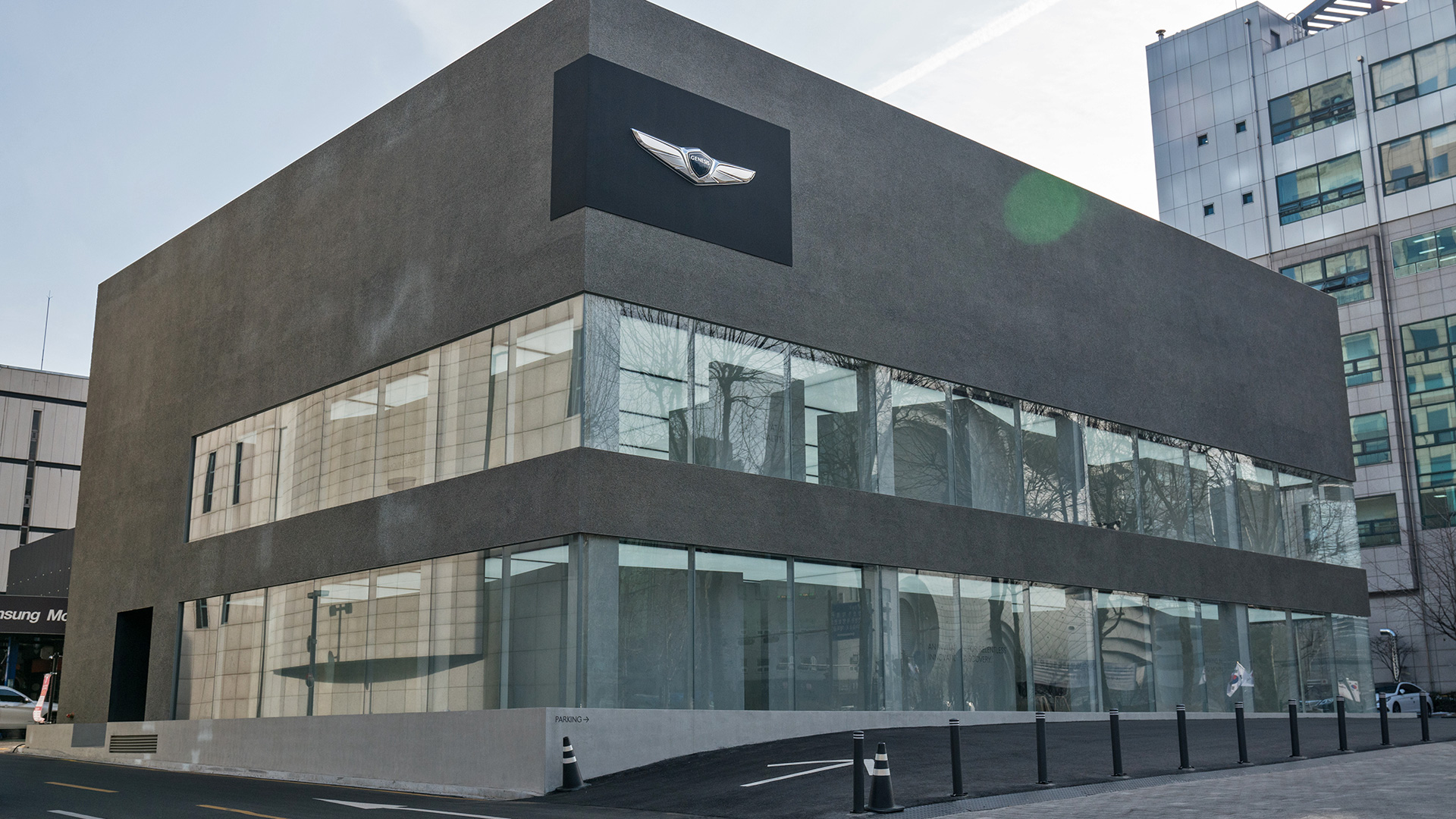

The building is gorgeous—designed, in fact, by renowned Dutch architect Rem Koolhaas. It’s mysterious—a minimalist work of concrete and glass—and also elegant, thoroughly free of the visual clutter of the average car dealership. But then again, it’s not really meant to be a dealership in the first place. It’s a simple showroom, placed strategically in the heart of Seoul’s upscale Gangnam District for the newly-standalone Genesis brand, the luxury spinoff of Korean-based global behemoth Hyundai. It’s meant to merely introduce curious car buyers to the marque, and then refer them to dealers once they’re interested.
It makes that introduction with all due discretion, barely even registering as an automotive presence from the street. There’s a logo on the façade and glimpses of vehicles—a fender here, a taillight there—peeking out between the severe concrete walls that divide up the interior space. Inside sits a selection of the brand’s three current models—the G90 (a.k.a EQ900 in Korea), the G80, and the G70, the latter of which will arrive in the U.S. this year. Samples of leather and paint hang tastefully in a nook, and a few sly phrases etched in stone convey the brand’s gestalt.

Look hard enough, you’ll also find a digital interface in a stealthily retractable screen that allows you to configure your car as you like via a tablet interface. That file can be emailed to you and forwarded to an off-site dealer…though there are representatives available at any given time to sit down with you in one of the coves—featuring tables and chairs fashioned from the same wood offered in the cars themselves—that can help you get the acquisition ball rolling. It’s all very subtle, and consciously free of sales pressure.

Upstairs, the process repeats with the same models for now, though the cars will vary as SUVs, crossovers, and sports cars flesh out the Genesis lineup. In the back, there’s a spartan launch pad for test drives, with your chosen model presented in a garage-like space behind a set of mirrored doors that open up to release you onto one of several different test-drive routes around Seoul. If you like, you can play with an augmented-reality app that lets you explore your car, access the owner’s manual, and figure out where the oil dipstick is.

Ultimately, Genesis Gangnam offers the kind of brand experience for those who err more on the side of humble discretion than open demonstration with their big-ticket acquisitions. Much like modern luxury cars themselves, the showroom conveys feelings of privacy, intimacy, and comfort, with subtle hints of the technology available behind the scenes. You won’t see big cutaway engines or transmissions here, or even much of the vehicle user experience beyond what you would seek out by sitting in one of the cars themselves; there are no banners touting backup cameras or laundry lists of safety features. That would be…gauche. Besides, humility is considered a virtue in Korea—this is why the nation’s top brands aren’t always associated with the country—and exuberant bragging of a product’s capabilities is still rare.

But also like the cars themselves, the technology is nevertheless infused in the experience, thanks to details like the AR app, the configurator, and even the mere presence of the cars right there in the living room. As much as the showroom is an oasis devoid of lowbrow palaver about specs and trim levels, it’s also very much an automotive Happy Place, particularly for those who yearn for the sort of modernist garages that invariably show up in the thick monthly owner magazines published by the likes of Aston Martin, Porsche, and Bentley, but which require seven-figure budgets to plop into your own home.

All that said, woven into the fabric of this showroom is the tension of a brand working to build itself up from scratch in a hotly competitive landscape of established luxury manufacturers.
“We’re new and still in broadcasting mode,” says Genesis brand boss Manfred Fitzgerald. “I’m not kidding myself—we’re just one-and-a-half years old and have low brand awareness right now. A showroom like this helps define who you are. What is the DNA of this brand and what does it stand for?” The showroom, he explains, is intended to boost that awareness and answer such questions.

Will the likes of Genesis’s clean Gangnam showroom come to America? Most likely yes, but not necessarily in an identical fashion, Fitzgerald notes. “With the semi-transparent design—we can get away with that here,” he says. “But we’ll have to adapt to local situations.”

By that, he means that an exported version may not have quite the same feel as this showroom. That might be disappointing…though understandable, given that a flashier presence might serve the brand better in the U.S. and elsewhere. Let’s just hope the vibe stays at least mostly true to the culture that shaped it. That is, let the product speak for itself, and allow the brand (and the space) to be a retreat from the world outside, much the same way the company’s cars strive to be.